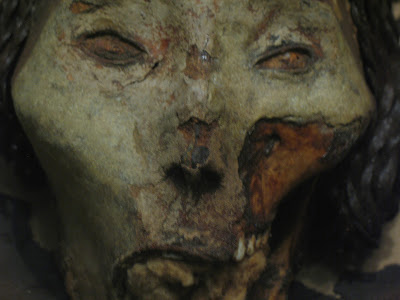The way we believe determines the way we will eventually
live. If we believe that morality is merely something we invent, we will invent
or delete convictions as we are confronted by new desires and pressures. Francis
Collins, former head of the Human Genome
Project, asked this critical question of the famous evolutionist, Richard
Dawkins, in a Times Magazine debate
(11/13/06, p. 55.):
·
“Do humans have a different moral significance
than cows in general.”
To this, Dawkins responded, “Humans have more moral
responsibility perhaps, because they are capable of reasoning.” However, prior
to this, Dawkins claimed, “I don’t believe that there is hanging out there,
anywhere, something called good and something called evil.”
But how then can any human be held responsible, even if we
do have more intelligence than cows? It’s like reasoning about the relative
merits of the good-tooth-fairy vs. the indomitable-snowman. If they don’t
exist, there’s nothing to reason about. If “good” and “evil” are not “hanging out there,” then “moral
responsibility” can be no more than a passing fad or an electro-chemical
impulse.
It’s like indicting someone for breaking a law that doesn’t
exist! If there isn’t an objective and unchanging moral principle to break,
then it is not objectively possible to hold anyone to account, no matter how
aware or intelligent she might be.
However, society will not survive for long in such a moral vacuum.
I remember reading that the existentialist Albert Camus concluded that “a man
without morals is a beast.” And he will also act like a beast if that’s all he thinks he is. Therefore, if
morals don’t ontologically exist, then we have to invent them.
Therefore, in The
Selfish Gene, Dawkims becomes the inventor:
- Let us try to teach generosity and altruism, because we are born selfish.
But will moral invention sustain society without an adequate
rational basis? Truly society needs generosity and altruism so it doesn’t unravel,
but ultimately, if it’s all about human selfishness without moral absolutes,
why shouldn’t it unravel? Why “teach
generosity and altruism?” If we’re selfish to the core, then why not be true to
that core and live it out?
Ultimately, secularism cannot answer these questions. What
makes us any more valuable than the bovine? Why should our admittedly selfish concerns
trump their concern for their own skins? And what if we’re more intelligent
than cows? Does a higher IQ make us more valuable? If there is no God who
created us in His image, then “value” is nothing more than a transient feeling,
a social construct or a chauvinistic bias.
Why not instead live according to the “survival of the
fittest,” as past evolutionists candidly proclaimed? Historian Richard Weikart
cites German pathologist Hugo Ribbert as a representative spokesman for the
evolutionists of his day - the beginning of the 20th century:
- The care for individuals who from birth onwards are useless both mentally and physically, who for themselves and their fellow creatures are a burden merely, persons of negative value, is a function altogether useless to humanity, and indeed positively injurious.
According to this construct, some humans are winners, while
some are losers, and your neighbors and your friendly family physician will
ultimately decide this for you. There is nothing that can rule out eugenics in
a world that deems some as “useless.” What happens to those who fail the IQ or
popularity test? What reasoning can be brought against Ribbert’s assertion that
those who society deems “useless” are not entitled to care? None!
What then of our cherished “Bill of Rights?” Why should it
pertain equally to everyone, whether useful or useless? If we follow the logic
of Dawkins and Hibbert, it shouldn’t! What then will be the fate of the
vulnerable members of our society? Should we even care?
There can be little doubt about the answer to these
questions. National Socialism and Atheistic Communism have given us compelling
testimony to this fact - that whenever our God is replaced by an “ism,” humanity,
stripped naked of His protective, value-imparting image (Genesis 1:26), becomes
an object to be manipulated or even exterminated by the overriding interests of
the “ism.”
When moral absolutes are eliminated, we eventually become
mere objects to serve the corporate “good.” Colson and Pearcey, How Shall We Now Live?, write about the demise of the Christian
worldview:
- Denial of sin may appear to be a benign and comforting doctrine, but in the end, it is demeaning and destructive, for it denies the significance of our choices and actions. It reduces us to a pawn in the grip of larger forces…Social planners and controllers then feel perfectly justified in trying to control those forces, to remake human nature and rebuild society according to their own blueprints—and to apply any force required toward that end. (pg. 183)
Dawkins has another problem. If he denies everything he
can’t touch and smell, then he should also deny that reason and logic are “hanging
out there.” Admittedly, reason and logic produce results, but the lack of moral
absolutes also produces results –
cynicism and contempt for any moralizing, anything that slows us in the pursuit
of our lusts.
The German poet Heinrich Heine was able to see the approach
of Hitler’s National Socialism from afar:
- "It is to the great credit of Christianity that it has somewhat attenuated the brutal German lust for battle...And should ever that taming talisman break--the Cross--then will come roaring back the wild madness of the ancient warriors...For thought goes before deed as lightening before thunder. There will be played in Germany a play compared to which the French revolution was but an innocent idyll." (cir. 1830)
If thought goes before deed, then our modern secular moral
relativists are paving the way for another great horror – perhaps even a series
of them.

No comments:
Post a Comment